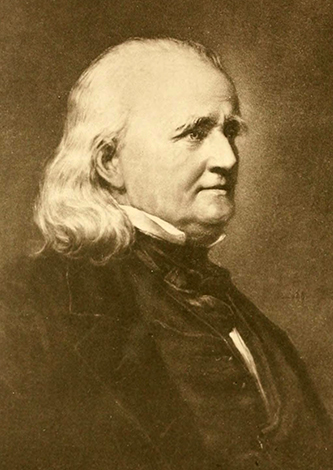That book told a dramatic story of Swift starting to organize an uprising against the British troops inside besieged Boston, only to be punished by being kept from his family and dying of illness as a result. It also credited that story to John Adams, a highly respected source who definitely knew Swift.
According to the section of that book in Joseph G. Swift’s own voice, Adams told him on 8 Oct 1817 about his grandfather: “I have written to Mr. [William] Wirt my opinion of the merits of that Whig, who fell a martyr to the fury of [Thomas] Gage.”
Adams’s first letter to Wirt did indeed mention Samuel Swift. However, Adams didn’t write that letter until 5 Jan 1818, three months after J. G. Swift’s well documented visit to Quincy.
Indeed, according to this letter from Thomas Cooper to Thomas Jefferson, as of 30 September Wirt’s biography of Patrick Henry was still in press; “about 100 pages are printed.” That was one week before Swift was in Quincy, leaving not enough time for Adams to get that book, read it, and resolve to write to the author.
J. G. Swift’s memory of what Adams said (or genealogist Harrison Ellery’s rendition of that memory) must therefore have been shaped by later knowledge of Adams’s letter, which was published in 1819.
As quoted back here, the general wrote to Adams in 1824, asking for any details about his grandfather. That shows he hadn’t heard the story of the uprising by then. But there’s no evidence that Adams ever wrote back, much less sent the dramatic story printed in that family memoir. At the time Adams was busy telling stories about heroic Boston lawyers in the Revolution, yet none of his other letters includes this story about Swift, either.
The Memoirs of Gen. Joseph Gardner Swift was sloppy about citing Adams in other ways. In the genealogical section Ellery wrote that Adams called Samuel Swift “a martyr to freedom’s cause.” But the J. G. Swift memoir says Adams actually said “martyr to the fury of Gage.” The “martyr to freedom’s cause” phrase came from A. K. Teele’s History of Milton. (Neither phrase appears in the surviving Adams Papers.)
Not that Teele’s book was on more solid ground. It followed James M. Robbins’s 1862 address on the history of Milton by quoting Adams this way: “Among the illustrious men who were agents in the Revolution must be remembered the name of Samuel Swift.”
In fact, Adams’s 1818 letter to Wirt said [emphases added]:
And in imitation of your example I would introduce Portraits of a long Catalogue of illustrious Men, who were Agents in the RevolutionAdams named thirty-eight prominent men, some of them Loyalists and all but one occurring to him before he came to Samuel Swift.
Jeremiah Gridley the Father of the Bar in Boston and the Preceptor of Prat Otis Thatcher Cushing and many others; Benjamin Prat Chief Justice of New York James Otis of Boston Oxenbridge Thatcher Jonathan Sewal Attorney General and Judge of Admiralty Samuel Quincy Solicitor General, Daniel Leonard, Josiah Quincy Richard Dana and Francis Dana his Son, Minister to Russia and afterwards Chief Justice, Jonathan Mayhew D.D. Samuel Cooper D.D. James Warren and Joseph Warren, John Winthrop Professor at Harvard Colledge, And Member of Counsal, Samuel Dexter the Father John Worthington of Springfield Joseph Hawley of Northampton, Governors Huchenson Hancock Bowdoin Adams Sullivan and Gerry Lieutenant Governor Oliver Chief Justice Oliver, Judge Edmund Trowbridge Judge William Cushing, and Timothy Ruggles ought not to be omitted. The Military Characters Ward Lincoln Warren Knox Brooks & Heath &c must come in of Course. Not should Benjamin Kent, Samuel Swift or John Read be forgotten.
[I’m not going to bother adding H.T.M.L. links for all those guys.]
TOMORROW: Examining the legend itself.

No comments:
Post a Comment